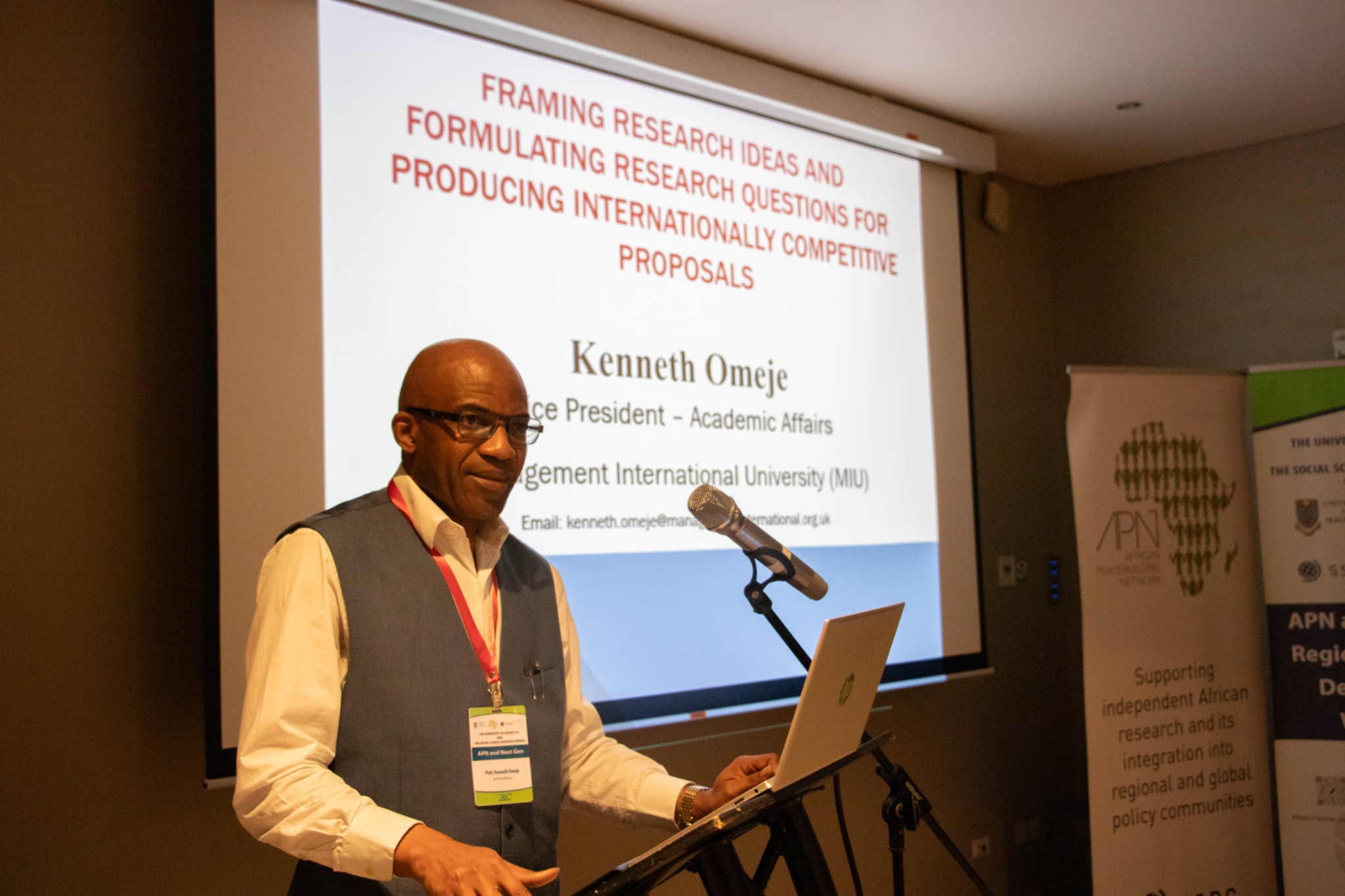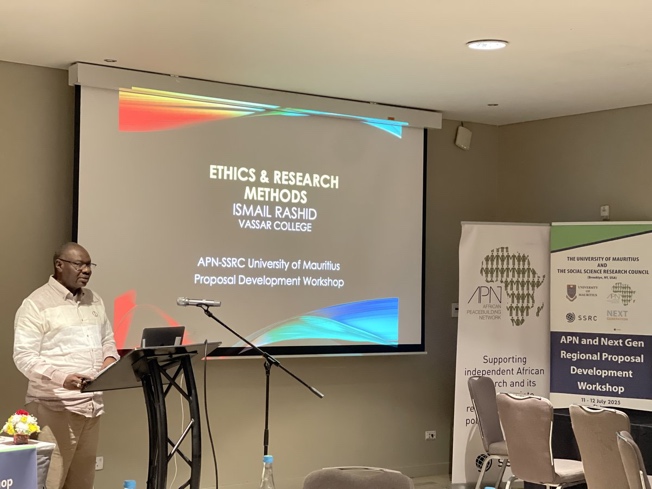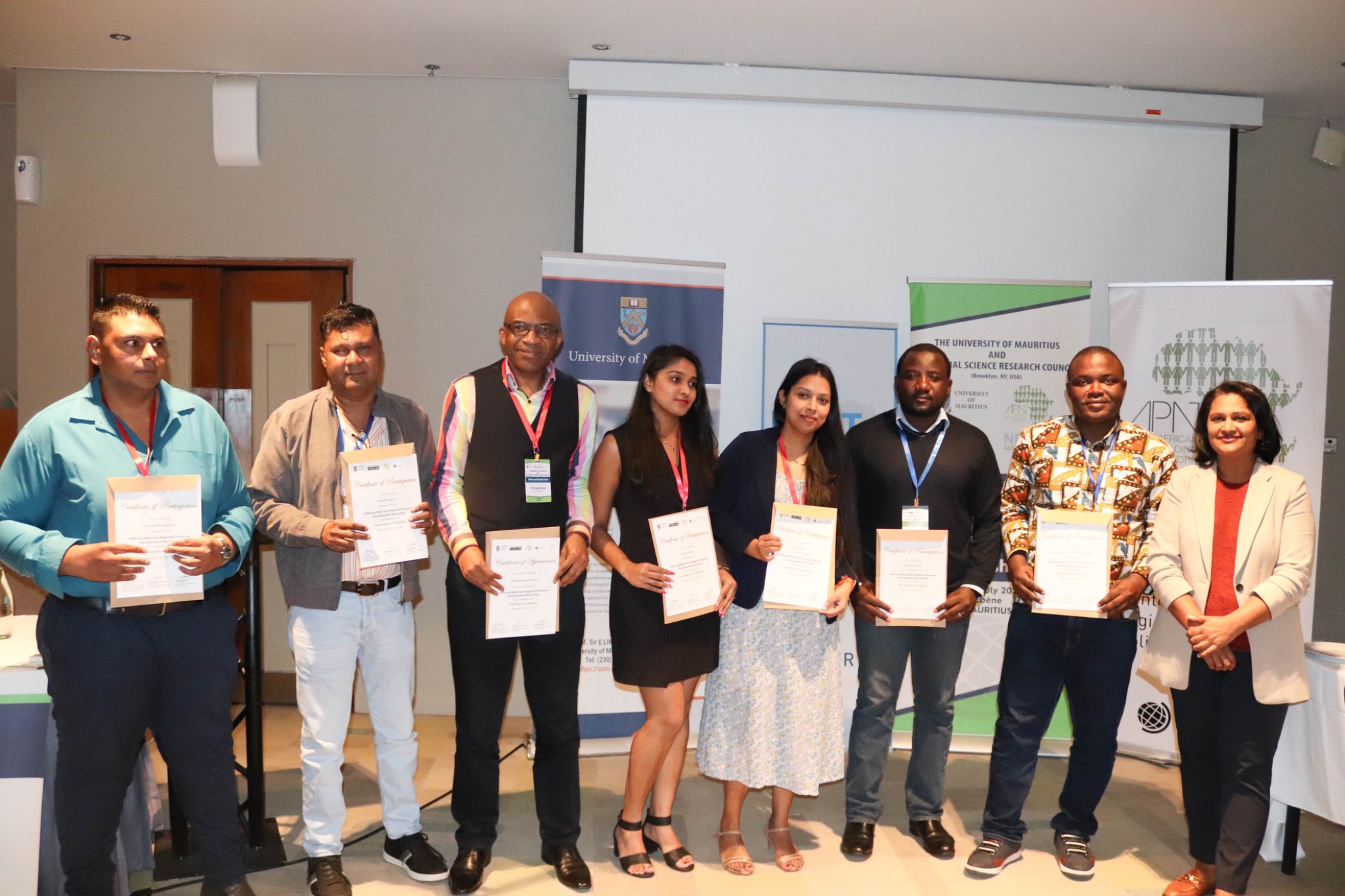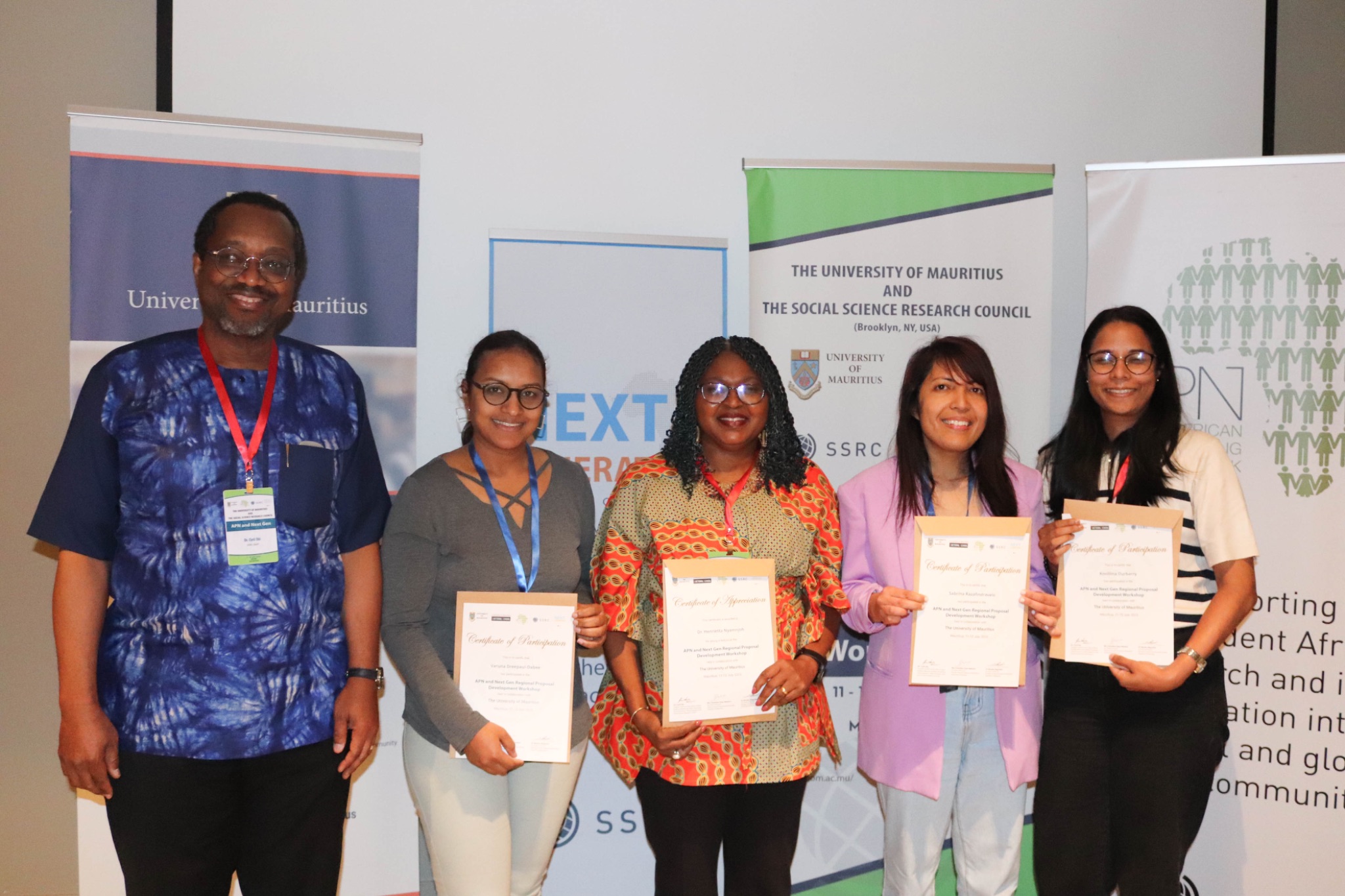- This event has passed.
The Social Science Research Council’s (SSRC) African Peacebuilding Network (APN) and Next Generation (Next Gen) Social Sciences in Africa Program, in collaboration with the University of Mauritius, held a Regional Proposal Development (RPD) Workshop from July 11 to July 12, 2025. Over a dozen participants from universities in Mauritius and neighboring Madagascar attended the two-day workshop, which was designed to provide opportunities for producing high-quality, internationally competitive research proposals and improve their chances of winning grants and fellowship award, while expanding opportunities for professional development through mentorship by highly experienced mentors from different parts of the world.
 Mrs. Christina Chan Meetoo, Senior Lecturer in Media and Communication at the University of Mauritius and Chair of the University of Mauritius Local Organizing Committee (LOC), joined by Dr. Nicolas Ragodoo, Senior Lecturer at the Faculty of Social Sciences and Humanities and a workshop session facilitator, delivered the opening remarks. They expressed gratitude to Professor Françoise Driver, SSR Chair of African Studies, Dr. Vidushi Neergheen, Director of the Doctoral School at the University of Mauritius, representatives from the Mauritius Higher Education Commission, the workshop’s mentors, and the members of the SSRC team. They also commended the diversity and quality of the research proposals submitted by workshop participants. The proposals covered critical themes such as peacebuilding, climate resilience, digital innovation, and gender justice, reflecting the dynamism of African scholarship.
Mrs. Christina Chan Meetoo, Senior Lecturer in Media and Communication at the University of Mauritius and Chair of the University of Mauritius Local Organizing Committee (LOC), joined by Dr. Nicolas Ragodoo, Senior Lecturer at the Faculty of Social Sciences and Humanities and a workshop session facilitator, delivered the opening remarks. They expressed gratitude to Professor Françoise Driver, SSR Chair of African Studies, Dr. Vidushi Neergheen, Director of the Doctoral School at the University of Mauritius, representatives from the Mauritius Higher Education Commission, the workshop’s mentors, and the members of the SSRC team. They also commended the diversity and quality of the research proposals submitted by workshop participants. The proposals covered critical themes such as peacebuilding, climate resilience, digital innovation, and gender justice, reflecting the dynamism of African scholarship.
 Dr. Cyril Obi, Program Director of the APN and Next Gen Program, followed with welcoming remarks, firstly acknowledging the distinguished guests, the University of Mauritius, and local partners for hosting the workshop and welcoming scholars from Mauritius and Madagascar. He introduced the SSRC’s century-long mission of promoting interdisciplinary social research globally and highlighted its long-standing commitment to African scholarship and research excellence through initiatives like the APN and Next Gen program. He likened a research proposal to a personal statement of intent, iterating the goals of the Research Proposal Development Workshop: to guide scholars in the process of refining and strengthening their research proposals, making them more compelling and internationally competitive. Mauritius, he noted, presents a unique opportunity for the SSRC to bridge connections between mainland and island Africa, while offering important lessons in conflict prevention and social cohesion. He concluded by encouraging participants to use the workshop as a space for professional growth, collaboration, networking and deeper engagement with mentors and peers.
Dr. Cyril Obi, Program Director of the APN and Next Gen Program, followed with welcoming remarks, firstly acknowledging the distinguished guests, the University of Mauritius, and local partners for hosting the workshop and welcoming scholars from Mauritius and Madagascar. He introduced the SSRC’s century-long mission of promoting interdisciplinary social research globally and highlighted its long-standing commitment to African scholarship and research excellence through initiatives like the APN and Next Gen program. He likened a research proposal to a personal statement of intent, iterating the goals of the Research Proposal Development Workshop: to guide scholars in the process of refining and strengthening their research proposals, making them more compelling and internationally competitive. Mauritius, he noted, presents a unique opportunity for the SSRC to bridge connections between mainland and island Africa, while offering important lessons in conflict prevention and social cohesion. He concluded by encouraging participants to use the workshop as a space for professional growth, collaboration, networking and deeper engagement with mentors and peers.
Dr. Neergheen expressed deep appreciation to the program and workshop organizers for their commitment towards nurturing the next generation of African scholars, deeply resonant with the mission of the University of Mauritius Doctoral School. She noted the timeliness of the workshop as the region and the world continue to face issues related to sustainability, climate change, and development challenges. Dr. Neergheen affirmed that the time of relegating capacity-building to a non-essential pursuit is over, asserting that it is of utmost importance to encourage and equip scholars with the tools to take advantage of the wide landscape of academic and research funding.
 Subsequently, Professor Driver, SSR Chair of African Studies and co-architect of the Research Proposal Development Workshop, delivered her keynote address, “Advancing Interdisciplinary Research Excellence in the Indian Ocean Region: Methods and Strategies”. Professor Driver argued that advancing interdisciplinary research excellence in the Indian Ocean region requires a collective commitment to rigorous, ethical, impactful, and inclusive research. She presented four themes central to advancing this agenda: embedding research excellence through ethics and integrity, breaking silos to encourage interdisciplinary research, reclaiming narratives through the decolonization of knowledge production, and strengthening the research-policy-diplomacy-peace nexus.
Subsequently, Professor Driver, SSR Chair of African Studies and co-architect of the Research Proposal Development Workshop, delivered her keynote address, “Advancing Interdisciplinary Research Excellence in the Indian Ocean Region: Methods and Strategies”. Professor Driver argued that advancing interdisciplinary research excellence in the Indian Ocean region requires a collective commitment to rigorous, ethical, impactful, and inclusive research. She presented four themes central to advancing this agenda: embedding research excellence through ethics and integrity, breaking silos to encourage interdisciplinary research, reclaiming narratives through the decolonization of knowledge production, and strengthening the research-policy-diplomacy-peace nexus.
Professor Driver identified institutional-level investment in international partnerships, research access and resources, strong doctoral infrastructure, and post-doctoral pathways as pivotal to this process. Furthermore, she argued that institutions must be more invested in creating and sustaining a culture of integrity and responsible stewardship in research, along with platforms for engagement between scholars, policymakers, practitioners, and civil society for the co-creation of impactful policies.
 The plenary was followed by three lectures, each presented by facilitators and mentors of the workshop. Professor Kenneth Omeje from the Management International University, United Kingdom, began with a lecture on “Framing research ideas and formulating research questions for producing internationally competitive proposals.” Professor Omeje introduced two fundamental branches of philosophy, ontology and epistemology, explaining how they serve as the foundation that guides the process in peacebuilding research, which is concerned with research ideas in the social world.
The plenary was followed by three lectures, each presented by facilitators and mentors of the workshop. Professor Kenneth Omeje from the Management International University, United Kingdom, began with a lecture on “Framing research ideas and formulating research questions for producing internationally competitive proposals.” Professor Omeje introduced two fundamental branches of philosophy, ontology and epistemology, explaining how they serve as the foundation that guides the process in peacebuilding research, which is concerned with research ideas in the social world.
The lecture further guided scholars on generating innovative research ideas by engaging with current events and formulating research questions that are focused, conceptually grounded, and reflective of the researcher’s understanding of knowledge and reality.
 The second lecture, “Conducting Literature Reviews and Developing Budgets” was presented by Dr. Henrietta Nyamnjoh from the University of Cape Town, South Africa. The lecture emphasized the literature review as a critical process where researchers engage with existing scholarship to identify gaps, challenge dominant narratives, and position their work. Rather than a summary, Dr. Nyamnjoh posited that it should be a strategic and reflexive exercise that shapes the research question and methodology. She encouraged instrumental reading, ethical citation, and attention to primary sources.
The second lecture, “Conducting Literature Reviews and Developing Budgets” was presented by Dr. Henrietta Nyamnjoh from the University of Cape Town, South Africa. The lecture emphasized the literature review as a critical process where researchers engage with existing scholarship to identify gaps, challenge dominant narratives, and position their work. Rather than a summary, Dr. Nyamnjoh posited that it should be a strategic and reflexive exercise that shapes the research question and methodology. She encouraged instrumental reading, ethical citation, and attention to primary sources.
 Professor Ismail Rashid from Vassar College, New York, USA, presented the final lecture, entitled “Research Methods and Ethics”, in which he underscored the importance of ethics in research, which requires ongoing responsibility, transparency, and respect throughout the research process. Professor Rashid highlighted that ethics form the essential foundation of responsible research, especially when working with vulnerable or less powerful populations. He maintained that researchers must foster reflexivity, an ethical and accountable mindset, as well as sensitivity to relationships, emotions, and power dynamics in the field.
Professor Ismail Rashid from Vassar College, New York, USA, presented the final lecture, entitled “Research Methods and Ethics”, in which he underscored the importance of ethics in research, which requires ongoing responsibility, transparency, and respect throughout the research process. Professor Rashid highlighted that ethics form the essential foundation of responsible research, especially when working with vulnerable or less powerful populations. He maintained that researchers must foster reflexivity, an ethical and accountable mindset, as well as sensitivity to relationships, emotions, and power dynamics in the field.
Following the last lecture, participants of the workshop joined their respective working group sessions for the remainder of the day to work on the development and refinement of their research proposals.
The second and last day of the workshop began with individualized sessions between participants and facilitators, offering space for tailored feedback, mentorship, and in-depth discussion of research proposals.
After the conclusion of the one-on-one sessions, a feedback session was held, followed by closing remarks by Dr. Obi. Special thanks were extended to facilitators, organizers, the University of Mauritius leadership, and student assistants for their dedication, energy, and support. Dr. Obi highlighted the importance of mentorship, collaboration, and inspiring the next generation of scholars. The workshop was lauded as transformative, bridging Africa’s mainland and island regions and building lasting academic networks, with the hope expressed that participants leave empowered, with stronger research skills and renewed commitment to high quality and impactful work.




The APN and Next Gen program is funded by Carnegie Corporation of New York.

 Events
Events